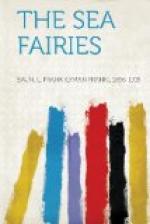“Seems to me that we have so much time it doesn’t matter,” said Trot. “What’s time for, anyhow?”
“Time is given us to be happy, and for no other reason,” replied the boy soberly. “When we waste time, we waste happiness. But there is no time for preaching, so I’ll go.”
“Please wait a moment, Sacho,” said the Queen.
“Can I do anything to make you happy?” he asked, smiling again.
“Yes,” answered Aquareine. “We are curious to know who does all this beautiful gold work and ornamentation.”
“Some of the slaves here are goldsmiths, having been taught by Zog to forge and work metal under water,” explained Sacho. “In parts of the ocean lie many rocks filled with veins of pure gold and golden nuggets, and we get large supplies from sunken ships as well. There is no lack of gold here, but it is not as precious as it is upon the earth because here we have no need of money.”
“We would like to see the goldsmiths at work,” announced the Queen.
The boy hesitated a moment. Then he said, “I will take you to their room, where you may watch them for a time. I will not ask Zog’s permission to do this, for he might refuse. But my orders were to allow you the liberty of the castle, and so I will let you see the goldsmiths’ shop.”
“Thank you,” replied Aquareine quietly, and then the four followed Sacho along various corridors until they came to a large room where a dozen men were busily at work. Lying here and there were heaps of virgin gold, some in its natural state and some already fashioned into ornaments and furniture of various sorts. Each man worked at a bench where there was a curious iron furnace in which glowed a vivid, white light. Although this workshop was all under water and the workmen were all obliged to breathe as fishes do, the furnaces glowed so hot that the water touching them was turned into steam. Gold or other metal held over a furnace quickly softened or melted, when it could be forged or molded into any shape desired.
“The furnaces are electric,” explained Sacho, “and heat as well under water as they would in the open air. Let me introduce you to the foreman, who will tell you of his work better than I can.”
The foreman was a slave named Agga-Groo, who was lean and lank and had an expression more surly and unhappy than any slave they had yet seen. Yet he seemed willing to leave his work and explain to the visitors how he made so many beautiful things out of gold, for he took much pride in this labor and knew its artistic worth. Moreover, since he had been in Zog’s castle these were the first strangers to enter his workshop, so he welcomed them in his own gruff way.
The queen asked him if he was happy, and he shook his head and replied, “It isn’t like Calcutta, where I used to work in gold before I was wrecked at sea and nearly drowned. Zog rescued me and brought me here a slave. It is a stupid life we lead, doing the same things over and over every day, but perhaps it is better than being dead. I’m not sure. The only pleasure I get in life is in creating pretty things out of gold.”




